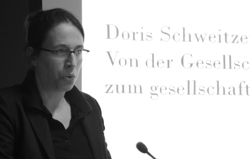M.A., Ass. jur. Doris Schweitzer
Universität Konstanz
Curriculum Vitae
- From November 2010 through October 2011 Junior Fellow at the Käte Hamburger Center for Advanced Study in the Humanities “Law as Culture”
- Since 2010 leader of the research group “Idome der Gesellschaftsanalyse”, cluster of excellence EXC 16 “Kulturelle Grundlagen von Integration” University of Konstanz
- 2010 obtained doctoral degree in sociology at the Albert-Ludwig University of Freiburg
- November 2009 – July 2010 Researcher at the cluster of excellence EXC 16 “Kulturelle Gundlagen von Integration”, University of Konstanz
- 2008-2009 stipend recipient at the graduate college “Die Figur des Dritten”, University of Konstanz
- April 2007 second state examination in law, Baden-Württemberg
- 2005-2007 legal clerkship in Germany and Vienna
- Since 2004 various teaching obligations at sociological institutes at the Albert-Ludwig University Freiburg, the Pädagogische Hochschule Freiburg and the University of Konstanz
- 2003 Magister Artium (Sociology) at the Albert-Ludwig University of Freiburg
- 2001 first state examination in law at the Albert-Ludwig University in Freiburg
- 1995 Diplôme d’Etudes Européennes at the Université de Sciences Sociales Toulouse
Research project
Juridical sociologists in the 19thCentury
The particularly (post-)structuralistically influenced present-time cultural and social science have a very ambivalent relationship to the object of ‘law’. One can denote a tendency to limit the conception of law to the image of criminal law viz. public law – be it in the framework of discussion on the disciplinary society and the dispositive of security, or in those on the state of exception and founding paradox. As such, ‘law’ often holds a negative function in the constitution of theories within the architecture of theories, against the backdrop of which the own approach is set.
This form of addressing the object results in historical assumptions on the correlation of law and sociology, or legal culture and cultural and social scientific thought, respectively. Either legal techniques, practices and discourse is accorded no role in the formation of sociology – at the most genealogical roots in the natural sciences, particularly biology, and psychology are sought. Or, on the other hand, the forms of truth and knowledge of the techniques of criminal procedure (Michel Foucault) or the legal regulation of guilt and responsibility (François Ewald) are seen as having an ‘epistemic power’, which led to the development of the concept of society viz. the creation of sociology.
The research project wishes to turn these perspectives around in a two-fold manner: on the one hand, it is to be investigated which role private law played in the formation of the concept of society viz. social science, with its terms, key distinctions and conceptions of order. On the other hand, a key emphasis is to be placed on the dogmatic discussion within private law from the second half of the 19th Century onwards, as an explicit reference to ‘society’ (e.g. Ihering, Freirechtsbewegung and Interessenjurisprudenz) can be discerned. For particularly in the classics, an examination of these private law questions can be found (e.g. Marx, Weber, Tönnies, Durkheim), which – so the thesis – assumes a constitutive function to theory. It should, finally, be discussed, to what extent one can – contrary to the assumption of a rivalry between law and sociology –rather speak of “juridical sociologists” in the historical perspective on the end of the 19th Century.
Publications (selected)
- Topologien der Kritik. Kritische Raumkonzeptionen bei Gilles Deleuze und Michel Serres, Dissertation (in progress).
- Edited together with Eva Eßlinger, Tobias Schlechtriemen, Alexander Zons: Die Figur des Dritten. Ein kulturwissenschaftliches Paradigma, Frankfurt 2010.
- Articel „Grenzziehungen und Raum in Manuel Castells' Theorie der Netzwerkgesellschaft“ in: Christoph Kleinschmidt, Christine Hewel (Eds.): Topographien der Grenze. Verortungen einer kulturellen, politischen und ästhetischen Kategorie. Würzburg: Königshausen & Neumann (forthcoming).
- „Topologie und Struktur: Topologische Strukturen bei Michel Serres“ in: Suzana Alpsancar, Petra Gehring, Marc Rölli (Eds.): Raumprobleme. Philosophische Perspektiven, München: Fink 2010 (forthcoming).
- „Language in the Trap of Space. The confrontation between space and language in the structuralism of Michel Serres“ in: Jänicke, Nadine et al.: Language and the moulding of space, Leipzig: Meine-Verlag 2010, pp. 63-78.
Research Interests
- Sociology of law
- Post-structuralism/structuralism
- Theory of culture
- Epistemology and genealogy of sociological societal analysis
- Theory of space


